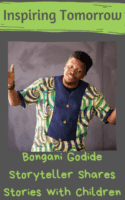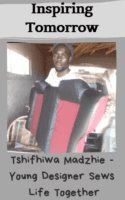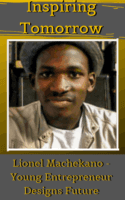Parents don’t always find time to spend with their children. Making ends meets takes priority, and kids miss out on beneficial activities such as being read to. Dynamic and enthusiastic storyteller, Bongani Godide, has made it his responsibility to share stories with children.
“I’m a storyteller, literacy development specialist and entrepreneur. I won the Sibikwa Storytelling Festival in 2004/5 and have worked for Kwesukela Storytelling Academy. I went on to join Nal’ibali until I resigned in 2017. I’ve performed at many different events in South Africa including the National Arts Festival, the Puku Storytelling Festival, the Freedom Park Storytelling Festival and many others. I facilitate workshops on different aspects of storytelling and story-play for ECD foundation and foundation phase educators.” Bongani has also been part of the National Book Week.
His calling for storytelling was always too loud for him to ignore.
“I realised my passion for storytelling long ago while I was working in communities in Pimville. I was part of the Tswelopele Youth Club and through that club I was involved with different programmes focusing on poetry and drama. We were performing at The Market Theatre Laboratory and the Zwakala Festival. At the time I was also part of a reading club where we worked with children. The funny part was that we didn’t have story books but we had a lot of fun.”
Bongani says if you want to be successful in what you do, then mingle with those who’re already successful at it.
“I was really inspired to tell stories by different people, but Mam Gcina Mhlophe was key because each time I saw her on different platforms, I kept on being motivated and kept going strong. At one stage she was performing at the Sibikwa Storytelling Festival and that changed how I see myself in the storytelling field, and that inspired my career.”
Told with passion and high energy, Bongani’s stories will make you reminisce about the olden days when your granny would tell you stories before bedtime.
“I spin magical folk tales like, ‘Why the Owl flies only at night’ and ‘The Lion and the Lamb’. Reaching is a rich cultural heritage. I bring life and layered-meaning to real life stories, from an ‘Old man fighting against exploitation’ to a ‘Young girl surviving human trafficking in Hillbrow’.”
Bongani is an avid reader himself and that makes him the jovial storyteller he is.
“I grew up in a home where we had a bookshelf. Books were part of our household. My grandfather loved books, he read almost daily. He was a plumber and always told me stories. It was at that time when I realised that stories are also found in books, and each of those are always new when you read. By telling stories to children we are actually helping children to imagine, creating in their own minds what a storyteller is telling.”
He concurs that reading is the cheapest way of travelling to different worlds.
“Stories are like worlds of their own. In many instances, wherever I tell stories, I always get the idea that there’s a world where all these stories take place. By telling stories we are creating an ability to imagine. We are taking our audience to the land where animals live, where the moral aspect of life is maintained and kept to. My love for stories is also inspired by how our continent is wealthy with untold stories. The southern part of this continent hasn’t been tapped to its fullest, and yet the richness inherited is greater and vast.”
Recent statistics show that only a mere two out of ten Grade 4 learners can read for meaning, in any language.
“It’s clear that we need to work with all the stakeholders in the country. Unfortunately most NGO’s in the literacy sector are now obsessed with numbers, and this has little impact towards addressing this problem. We need to work with parents, practitioners, and educators, and literacy activists like myself to really engage and implement programmes on the ground. I’m also a volunteer at Amaqhawe Akusasa reading club based in Pimville. Together with other member of the community, we share the love for literacy development.”
Bongani hopes to combat some of the social ills through literacy.
“I have recently started a company called WatotoLand, a multifaceted media company in the literacy development sector. Our core business is storytelling, podcasting, story-plays and television. Our company is driven by different values, hence the passion to address some of the problems that the country is facing. We know that reading contributes towards economic development and other spheres of humanity.
Bongani concludes with a few words of advice.
“We’re a country with so much potential. We are able to stand up for our rights. We are a people that fought against colonialism and apartheid. The blood of the Zulu warriors that won the battle at Isandlwana runs in our veins. We have built this country to make it the most industrialized in the African continent.” He closes the book.
“This is the energy, creativity and strength we have as a nation: in everything we do, from a car wash, spaza shop, or whatever type of small business we do, we must put in the same effort and hard work. We need to keep in mind what our great fathers and mothers did for this country. Start selling something, no matter how small it is. Just sell and keep on doing it, don’t stop.”
***
Tell us: What inspires you the most about Bongani’s story?





